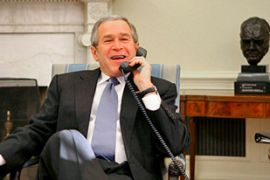US court dismisses Bush spying case
Court rules plaintiffs have no right to challenge eavesdropping programme.

However, Judge Julia Smith Gibbons, one of the appeals court’s Republican appointees, said that the plaintiffs did not have standing or the legal right to sue.
She said the plaintiffs failed to show they were subject to the surveillance and therefore do not have standing for their claims.
‘Unchecked surveillance’
Melissa Goodman, ACLU lawyer, said the decision effectively protects the wiretapping programme, which was abandoned in January, from any judicial review.
“The Bush administration is basically left free to violate an act of congress with impunity – the foreign intelligence surveillance act, which congress adopted over 30 years ago to prevent the executive from engaging in precisely this kind of unchecked surveillance,” Goodman said.
“They are effectively saying you can’t show that you’ve been wiretapped and you’ll never be able to show that you’ve been wiretapped because the whole thing is so secret.”
The dissenting voice on the three-member panel, Judge Ronald Lee Gilman, a Democratic appointee said he would uphold the ruling on the grounds that the programme violated the intelligence surveillance act law of 1978.
A US district court in Detroit, Michigan, ruled in August last year that the programme violated the US constitution and the 1978 law prohibiting surveillance of US citizens on US soil without the approval of the special surveillance court.
The Bush administration appealed, and a court in Cincinnati set aside the judge’s decision. If the ACLU does not appeal the ruling, the case will be sent back to the judge in Michigan for dismissal.